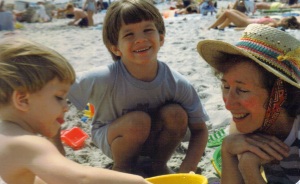
Whoa! I didn’t see THAT coming!!!
Our lives had become less stressful and more uneventful. Chris seemed more stable. Life felt somewhat normal. The turbulence of Chris’s mental illness (MI) had disappeared. Or so I thought. It simply took up residence inside me! I never expected inner turmoil to hit me. Not when things seemed to be resolved. Chris had appeared to have recovered from his psychotic episode. God had helped me hold it together during the time Chris needed me. It made no sense that I’d start losing it for no apparent reason.
This part of our story illustrates how God met my personal needs. When loneliness and torment hit, God provided: freedom from my anguish, strengthening of my heart, restoration of my soul, protection of my sanity, assurances of His presence, and healing as a result of His comfort.
♦♦♦♦♦♦
MI had shaken our lives. But our household seemed to be recovering. We were picking up the pieces of our lives and moving on. Just like the calmness that follows an earthquake. But just like with an earthquake, I experienced aftershocks.
Merriam-Webster’s online dictionary defines ‘aftershocks’ as, “an aftereffect of a distressing or traumatic event.”
My mind, body, and emotions were reacting to the traumatic events surrounding Chris’s hospitalization. Painful reactions hit unexpectedly. Without obvious provocation.
December 1997 was a tough month for me. The holiday season brought many reminders of the previous year. Buying gifts, baking cookies, addressing cards, and … band rehearsals.
Something would trigger a memory and I’d experience a flashback. Before then, I didn’t know much about flashbacks. I had mistakenly thought flashbacks only happened to soldiers who had witnessed horrific things in battle. Suddenly they became very real. Too real. My mind and emotions would instantly be rocketed back to the Christmas season of 1996.
Like the time I attended a faculty meeting. Teachers were meeting with the music teacher to discuss details of the upcoming elementary Christmas program.
“First graders will be singing ‘Joy to the World’,” she explained.
She began playing the carol. Memories of Chris playing that song sabotaged my thoughts and emotions. All I could hear was his trumpet playing the tune in a distorted way. His voice, almost audible, echoed in my mind saying, “When I sound the trumpet by playing the song the right way, the world will end.”
The flashback unleased suppressed emotions. My heart began pounding. The dam, holding back months of tears, started to leak. Before it erupted, I quietly excused myself and headed for the nearest bathroom.
Obviously the year before I hadn’t processed what I’d seen. Hadn’t dealt with my emotions. No wonder. I had been consumed with helping Chris return to reality.
Flashbacks caught me by surprise. Causing my emotions to spill out. I found myself falling apart at unexpected times and inopportune places. The more my mind periodically replayed awful scenes, the deeper my depression grew.
The enemy taunted me with fears that I might lose my own mind. But I trusted in the promise that, “The peace of God, which transcends all understanding, will guard your hearts and your minds in Christ Jesus (Philippians 4:7).”
Dear Father, Your Word says, “You will keep in perfect peace those whose minds are steadfast, because they trust in you (Isaiah 26:3).” Oh how I need Your perfect peace! Help me through my grief and flashbacks.
I rested in my firm belief that, “God has not given us a spirit of fear, but of power and of love and of a sound mind [Timothy 1:7 (NKJV)].”
A sound mind. That was my goal. God was the Glue that held me together. My divine Sanity Preserver prevented me from tumbling into a deep pit of inconsolable despair.
I felt exhausted all the time. So I ate foods with carbohydrates, hoping they’d give me the energy needed to face each day.
During this time of flashbacks and depression, sound sleep eluded me. I needed rest. Like God’s people who wandered forty years in the wilderness. God knew they were tired and fearful. So He gave Joshua the perfect words of encouragement for them. Joshua relayed the message and said, “Remember the command that Moses the servant of the Lord gave you after he said, ‘The Lord your God will give you rest by giving you this land.’”
When I read Joshua 1:13 it felt like God was speaking to me.
Thank You, Father, for Your promise to give me rest.
The familiar twenty-third Psalm offered new hope for me. It guaranteed my soul would be restored. And promised me His presence and comfort.
“He restores my soul;He leads me in the paths of righteousness for His name’s sake. Yea, though I walk through the valley of the shadow of death, I will fear no evil; Your rod and Your staff they comfort me [Psalm 23:3-4 (NKJV)].”
Each flashback threatened to break my heart once again.
“God, help me!” is all I could utter. Offering up the prayer of a drowning person. God threw me His Life Saver in the shape of Psalm 31:23-24.
“Oh, love the Lord, all you His saints! For the Lord preserves the faithful … Be of good courage, And He shall strengthen your heart, All you who hope in the Lord (NKJV).”
Yes, Lord, my hope is in You. Thank You for hearing my cry. I praise You for strengthening my broken heart.
My carbohydrate diet led to weight gain. I gained lots of weight. That motivated me to go to Dr. Kent (the physician who first treated Chris when he became out of touch from reality).
“What can I do to deal with my fatigue?” I asked.
Knowing what I’d been going through with Chris he asked, “Is it possible you’re depressed?”
“I guess it’s possible,” I replied.
“I’ll write you a prescription for Prozac. That should help remove the cloud and help you sleep better.”
Reluctantly, I took the medication. If I’d learned nothing else, I’d learned to take MI seriously. Even my own depression.
Once the holiday season ended, I began feeling much better. As Dr. Kent predicted, the medication lifted the cloud and helped me sleep better. So I stopped taking the Prozac. There were a few more months before the next critical period. During those winter months, things remained uneventful with Chris.
Work got busier for me. In addition to my usual responsibilities as Director of Instruction and Director of Special Education, I was planning a Math and Bible Olympics for the school. Applications for new students began pouring in. With not enough time to do everything at work, I read the applications at home. I was back to spending time working at home. But this time I was careful to spend a more reasonable amount of time. Mindful of my need to stay focused on Chris’s well-being.
During that winter the Lord led several parents my way who had children with some sort of MI. Many of the mothers expressed trouble dealing with their situation. I wasn’t alone in my struggles.
One of our neighbors told me her daughter had symptoms of a head injury.
“Kelly has suffered a head injury. We don’t know what caused it. And we don’t know what the future holds for her. Life has become so uncertain.”
“I have some idea what you’re experiencing. Chris suffered a psychotic episode a year ago. His MI turned our lives upside down,” I confided.
My news helped the mother feel safe to admit the truth.
“Actually, the doctors told us Kelly’s symptoms are psychosomatic. They didn’t find any evidence that she suffered a head injury.”
“A psychiatrist would know what’s best for Kelly. Let me know if you want the name of a good psychiatrist.”
“I’m not convinced she didn’t have a head injury. Please don’t tell anyone what I’ve told you,” was her only reply.
Apparently the mother couldn’t deal with the thought of her daughter having MI. It seemed easier for her to continue believing the cause of the symptoms was related to a head injury.
Another mother told me she had to take medication to treat panic attacks.
“My son’s MI has caused me to get panic attacks,” she confided.
Several parents asked me for advice. Many wanted to know how to get their children with MI to agree to speak to a psychologist. One father of a teenage son with MI asked a slightly different question.
“My son isn’t happy with the psychiatrist he’s going to. His MI prevents him from going to school. If he discontinues treatment, he’ll never get back to school. What should I do?”
“Find another psychiatrist,” I answered.
He answered in an exhausted tone, “Yeah, I know that might help. I just can’t seem to find the time or the energy to even begin looking for another doctor.”
I completely understood.
Another husband and wife were contemplating putting their seriously depressed son in foster care. A mutual friend shared the news with me and added this judgmental statement:
“Can you believe they would even consider abandoning their own son?”
“Unless you’ve experienced what they’re going through, you can’t begin to understand what it’s like. You can’t possibly imagine what it’s like to have a child who is suffering from an illness you can’t see or measure. You can’t know the pain of having a child who rejects your love or attempts to nurture and comfort. And there’s no break to the misery. Because of the nature of MI, parents can’t get out together. They go months without any respite time for themselves.”
It helped to discover I wasn’t alone. Knowing others who were experiencing MI comforted me some. Not nearly as much as the realization that God was with me at all times. His constant presence comforted me. I found true rest and perfect peace in His presence.
His steadfast companionship yielded great strength and courage. I faced each new day with the assurance He’d be with me. When I started to feel emotionally fragile, Deuteronomy 31:6 restored my confidence. Reminding me to, “Be strong and courageous. Do not be afraid or terrified because of them, for the Lord your God goes with you; he will never leave you nor forsake you.” And He never left me.
♦♦♦♦♦♦
You may be experiencing flashbacks or struggling to recover from bad experiences with your child’s MI. Ask God for His grace by praying the words of Psalm 25:16-17.
“Turn to me and be gracious to me, for I am lonely and afflicted. Relieve the troubles of my heart and free me from my anguish.”




















